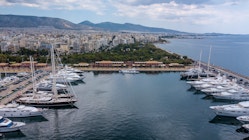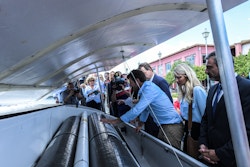Athens, Greece
Energy Observer, has arrived at Athens, Greece, twentieth stopover of its world tour. After a turbulent navigation in the Aegean Sea, the vessel has reached the Peloponnese. It will stop over at the Flisvos Marina to meet with Athenians until June 23rd, 2018.
Coming from: Samos, Grèce
Time of arrival: 9:00 AM

Energy Observer moored in the port of Athens
Off to Athens
Energy Observer has been navigating the Mediterranean since March 28th. After Tunisia, Israel and Cyprus, the vessel traveled through the Greek islands, from Crete to Dodecanese to the Cyclades Islands, to shoot it’s documentary series “Odyssey for the future” meeting the pioneers who work for a cleaner and more solidary planet.
After leaving Mykonos on Monday, June 18th, at 3 pm, the crew reached Athens on Tuesday, June 19th, at noon, having traveled 90 nautical miles during a 21-hour trip. The vessel will stay in Athens for 5 days so that the public can discover the onboard technologies of the first hydrogen vessel around the world, a laboratory for tomorrow’s energy, and to meet local ecological transition pioneers, to discover the innovations met during the journey in Greece.

Energy Observer moored in the port of Athens
Greece, an archipelago with many green and solidarity initiatives.
The country, which is facing the most serious economic crisis of its history, must now deal with major environmental problems – hydric stress, pollution, mass tourism, intense maritime traffic, conservation of the Mediterranean sea which is more vulnerable than ever. How to make the environmental cause worthwhile in this present context? A complex challenge for the transition actors, and a good illustration for the crew of the interconnections between the 17 Sustainable Development Goals adopted by the UN, for which the vessel is the first French ambassador. Because many are actually convinced that the protection of ecosystems, the energy transition and the reconversion of old companies can make it possible to develop new social connections, generate value and, ultimately improve the country’s situation in a significant manner. These are topics which the Energy Observer team, led by Victorien Erussard and Jérôme Delafosse, has wished to explore while crossing through the Greek islands.
Athens, the last stop in Greece
The Greek capital will mark the final stop of the nearly three week Odyssey across the country, one of the longest of the expedition. The stop will be classified as a meeting with the public, but also with local authorities, economic players, and partners who are all gathered to welcome Energy Observer and to remind their support of this initiative.
At the press conference held on board this Tuesday, June 19th, the French Ambassador, Christophe Chantepy, praised the project’s daring and exemplary nature, which epitomizes the future thanks to its innovative ecological technologies. He particularly emphasized how Energy Observer initiative was part of the efforts France had made to contribute concretely to the international fight against the effects of climate change.

Victorien presents hydrogen storage spaces
The meetings held in Greece will be filmed as part of the documentary series “L’Odyssée pour le futur“, that the Canal+ group broadcast at the beginning of 2018. But also in a web series on concrete and applicable solutions, to acknowledge the implementation of the 17 sustainable development goals adopted in 2015 by the UN, all over the World, and of which Victorien Erussard is the first France ambassador.

The eventful departure from Athens, where the crew was surprised by a violent thunderstorm!
All For Blue, spring cleaning
This is part of Energy Observer Solutions, the platform for pioneers committed to transforming the world. To learn more, please visit our dedicated website.
Discover Energy Observer SolutionsIn the space of 4 years, the All For Blue association has recovered over 200 tonnes of waste from the beaches and the sea bed with the aim of recycling it and studying its impact on the ecosystem.